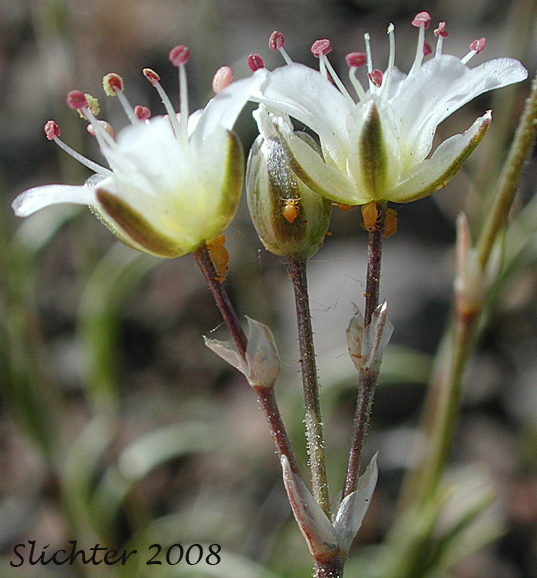
 The photo at right shows a close-up of the flower of mountain sandwort as seen along Cold Springs Ridge Road in the northern Wallowa-Whitman N.F..........June 26, 2008.
The photo at right shows a close-up of the flower of mountain sandwort as seen along Cold Springs Ridge Road in the northern Wallowa-Whitman N.F..........June 26, 2008.
Mountain sandwort is a small perennial with numerous slender rhizomes which forms loose mats or patches of plants up to 20 cm in diameter. The herbage of the stems is glabrous below and glandular-pubescent on the upper stems and amid the inflorescence. The erect flowering stems rise from 5-30 cm high. The numerous basal leaves are all narrowly linear, erect or ascending, and somewhat recurved. The basal leaves measure 2-4 cm long and from 0.5-1 mm wide. The individual leaves are somewhat flexible and soft in texture (not sharp as in Arenaria aculeata). The 2-4 pairs of stem leaves are about half as long as the basal leaves.
The flowers are found in small, open cymes at the terminus of the stems. The sepals are ovate in shape with obtuse to somewhat pointed tips and they range from 3-4.5 mm long. The sepals are also somewhat membranous-margined and purplish in color. The 5 white petals range from 1.5-2.5 times longer than the sepals. The 10 ascending to spreading stamens are about as long as the petals and bear reddish to brownish anthers at their tips. The pistil typically bears 3 short styles.
Prickly Sandwort (Arenaria aculeata): Typically has shorter lower leaves less than 2 cm long that are sharp-tipped with the 2-4 pairs of stem leaves short, typically less than one-half the length of the lower leaves.
King's Sandwort (Arenaria kingii): The sepals are broadly lanceolate to narrowly ovate with acute to accuminate tips. The lower leaves are over 2 cm long and and soft in texture. The 2-4 pairs of stem leaves are over one-half the length of the lower leaves, or may be nearly equal in length of the lower leaves.
Mountain sandwort may be found from sagebrush plains to the rocky slopes at timberline in the mountains.
Mountain sandwort may be found from Alaska south in the Cascade, Olympic and Rocky Mts. to California and northern Nevada. It is found eastward to Alberta and Montana. It is also found in Eurasia.